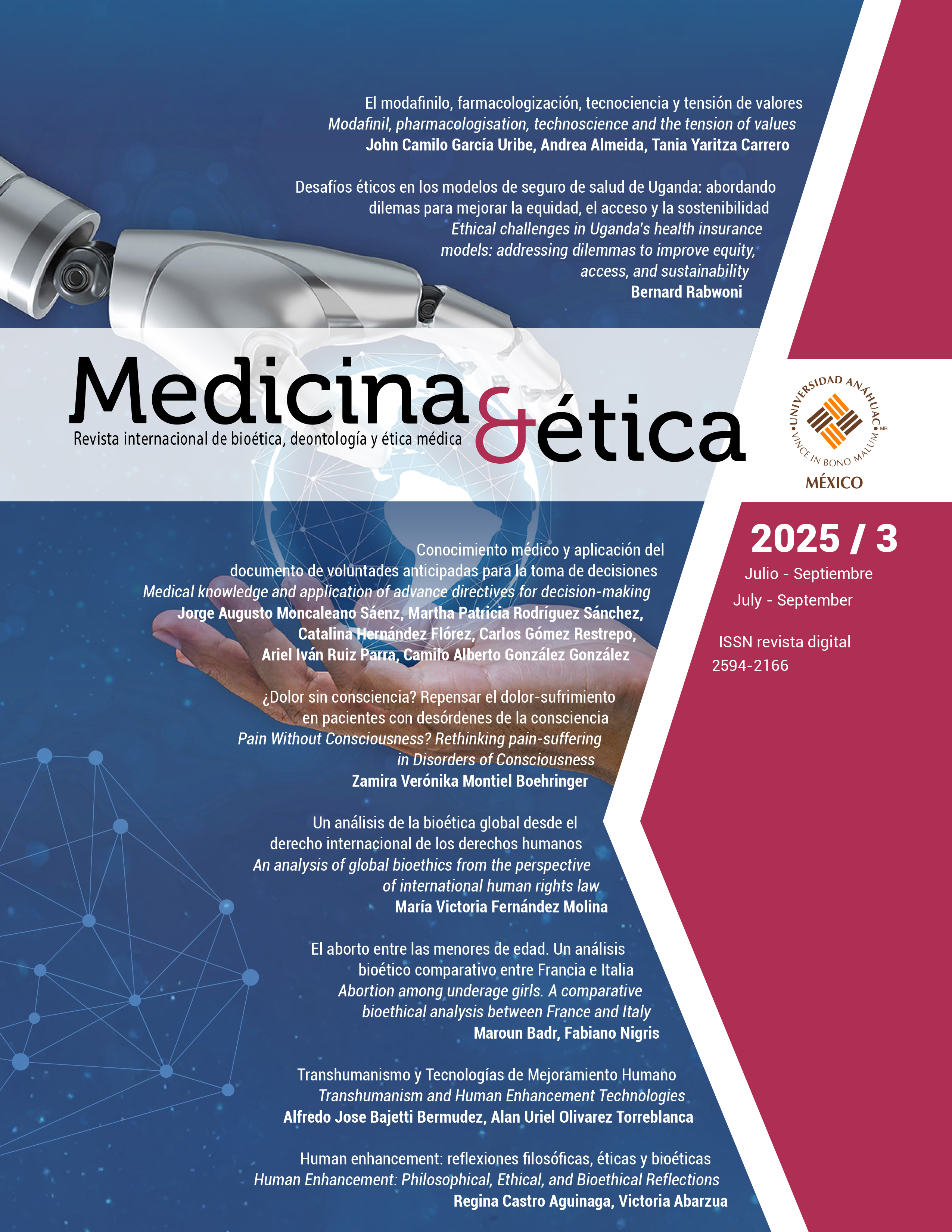An analysis of global bioethics from the perspective of international human rights law
Main Article Content
Abstract
This article discusses the need to integrate global bioethics with International Human Rights Law (IHRL) in order to coherently address the ethical and legal dilemmas of an interconnected world. Starting from the principle of universality, it argues that certain values, such as human dignity, care for future generations, and the protection of the common home, must be guaranteed to all people without distinction. Based on this foundation, global bioethics provides an interdisciplinary framework that allows for addressing issues such as the climate crisis, health inequities, and the violation of the rights of vulnerable groups. At the same time, the interdependence and indivisibility of human rights is recognized, meaning that their defense requires comprehensive approaches that do not fragment reality, but instead offer integrated ethical, legal, and political solutions.
Downloads
Article Details
Section

This work is licensed under a Creative Commons Attribution-NonCommercial-ShareAlike 4.0 International License.
Medicina y Ética is distributed under a Creative Commons License Atribución-NoComercial-CompartirIgual 4.0 Internacional.
The author keeps the property rights with no restriction whatsoever and guarantees the magazine the right to be the first publication of the work. The author is free to deposit the published version in any other medium, such as an institutional archive or on his own website.
How to Cite
References
1. Jahr F. Bio-ética: una perspectiva de las relaciones éticas de los seres humanos con los animales y las plantas. Aesthethika. 2013 (1927); 8(2):18-23. Disponible en: https://www.aesthethika.org/Bio-etica-una-perspectiva-de-las
2. Potter VR. Global Bioethics. Building on the Leopold Legacy. Michigan: Michigan State University Press; 1988.
3. Reich W. Encyclopedia of Bioethics. Nueva York: Schuster; 1978.
4. Potter VR. Global Bioethics: Building on the Leopold Legacy. Michigan: Michigan State University Press; 1988.
5. Have HT. Global Bioethics: An Introduction. Routledge; 2016.
6. Ortega M. C., Zapata R. E., Castillo V. S. Bioética y derecho: tendencias y líneas de investigación. Revista Jurídica Mario Alario D´ Filippo. 2024; 16(33):301-321. Disponible en: https://revistas.unicartagena.edu.co/index.php/marioalariodfilippo/article/view/4894 DOI: https://doi.org/10.32997/2256-2796-vol.16-num.33-2024-4894
7. Comisión Preparatoria de la Corte Penal Internacional. Examen histórico de la evolución en materia de agresión; 2002.
8. Touraine A. El fin de las sociedades, México: Fondo de Cultura Económica; 2016.
9. Trinidade A. La Humanización del Derecho Internacional Contemporáneo. México: Porrúa; 2014.
10. Naciones Unidas. El derecho Internacional de los Individuos y de los Grupos. [Internet]; 2024 [citado 21 de enero de 2025]. Disponible en: https://www.un.org/es/globalissues/humanrights#:~:text=El%20derecho%20internacional%20de%20los,individuos%20o%20de%20los%20grupos
11. Favioli F. La protección de los derechos económicos, sociales y culturales en el sistema interamericano de derechos humanos. Revista IIDH. 2004; 36:101-167. Disponible en: https://www.corteidh.or.cr/tablas/r06729-4.pdf
12. Acosta J., Duque-Vallejo A.M. Declaración Universal de Derechos Humanos, ¿Norma de Ius Cogens? Int. Law: Rev. Colomb. Derecho Int. 2008; Edición Especial(12):13-14. Disponible en: https://revistas.javeriana.edu.co/index.php/internationallaw/article/view/13917
13. Cuellar F. Evolución jurídica y el impacto de las recomendaciones de la CIDH en el Derecho Internacional y los derechos humanos. Rev Boliv Der. 2024; 37(792–807).
14. Cáceres LF. El sistema de Hard-Law y Soft-Law en relación con la defensa de los derechos fundamentales, la igualdad y la no discriminación. In Cuadernos electrónicos de filosofía del derecho; 2019.
15. Marthoz JP. Los Derechos Humanos Después del 11 de Septiembre. Convergencia. Revista de Ciencias Sociales. 2003; 10(33).
16. United Nations. Report of the Independent Inquiry into the actions of the United Nations during the 1994 genocide in Rwanda. Nueva York: United Nations; 1999.
17. Longobardo M. La aplicabilidad del Apartheid a las situaciones de ocupación: en las encrucijadas entre el derecho internacional humanitario, el derecho penal internacional y el derecho internacional de los derechos humanos. Anu Mex Der Int. 2024; 24(3-36). https://doi.org/10.22201/iij.24487872e.2024.24.17556 DOI: https://doi.org/10.22201/iij.24487872e.2024.24.17556
18. Sassòli M, Bouvier A, Quintin A. How does law protect in war? Ginebra: ICRC; 2011.
19. González AD, Cilia VG, Aradillas C, Castañeda A, De la Cruz A, Zúñiga J. La seguridad alimentaria y nutricional en una comunidad indígena de México. Esp NutrComunitaria. 2019; 25(3).
20. Corte Internacional de Justicia. Consejo de Namibia. 1971. Consecuencias jurídicas para los Estados de la continuación de la presencia de Sudáfrica en Namibia (Sudoeste de África) a pesar de la resolución 276 (1970) del Consejo de Seguridad. Opinión consultiva de 21 de junio de 1971. CIJ Recueil 1971; 16.
21. Justicia. CId. Asunto Muros de Palestina. Consecuencias jurídicas de la construcción de un muro en el territorio palestino ocupado. Opinión consultiva de 9 de julio de 2004. CIJ Recueil 2004; 136.
22. Finnis J. Natural Law and Natural Rights. Oxford: Oxford University Press; 2011.
23. I ÁG. Universales, absolutos e inalienables: los derechos indestructibles. Rev Humanid Valparaíso. 2014; 4:63- 80. https://doi.org/10.22370/rhv2014iss4pp63-80 DOI: https://doi.org/10.22370/rhv/20144/24
24. ONU Mujeres. Erradicar la mutilación genital femenina en la Uganda rural. [Internet]; 2022 [citado 21 de enero de 2025]. Disponible en: https://www.unwomen.org/es/noticias/reportaje/2022/02/erradicar-la-mutilacion-genital-femenina-en-la-uganda-rural
25. Pastor Bravo María del Mar. Estrategias para el abordaje y prevención de la mutilación genital femenina desde la Enfermería: una revisión videográfica. Index Enferm. 2015; 24:159-163. https://dx.doi.org/10.4321/S1132-12962015000200009 DOI: https://doi.org/10.4321/S1132-12962015000200009
26. Castañeda M. El principio pro persona en el Derecho Internacional de los Derechos Humanos UNAM B, editor. Ciudad de México: Comisión Nacional de Derechos Humanos; 2015.
27. L. CM. El asilo diplomático y el principio de no devolución. Polit Glob Ciudad. 2019; 5:97-109. Disponible en: https://www.redalyc.org/articulo.oa?id=655869229003 DOI: https://doi.org/10.29105/pgc5.10-5
28. Office of the High Commissioner for Human Rights. International Legal Protection of Human Rights in Armed Conflict. Nueva York; 2011.
29. Brotons AR. Derecho Internacional. Curso General Valencia: Tirant Lo Blanch; 2010.
30. G. Z. El derecho dúctil: ley, derechos, justicia. Madrid: Trotta; 1995.

